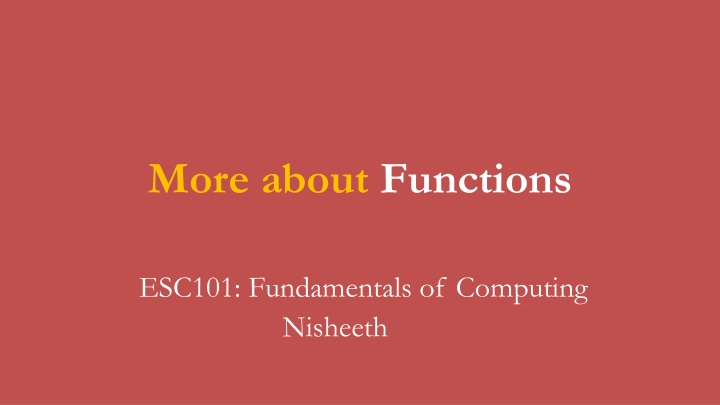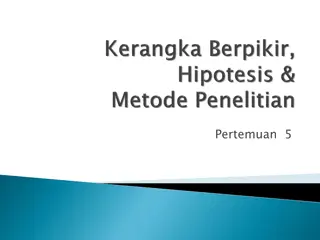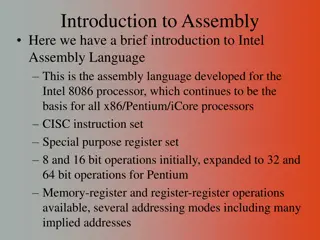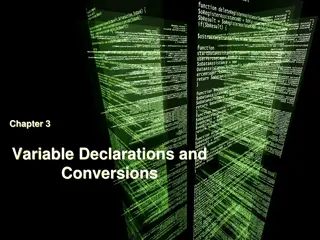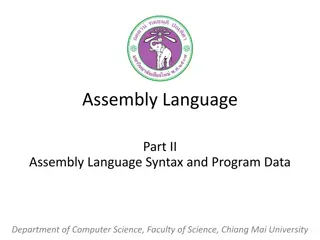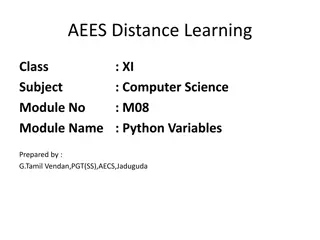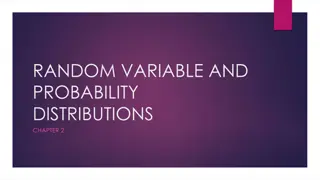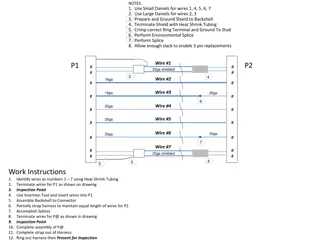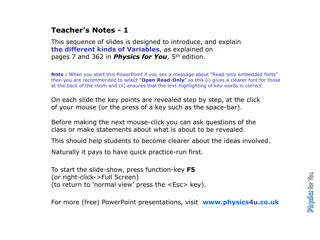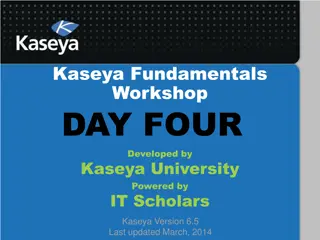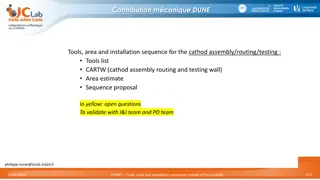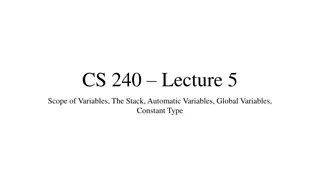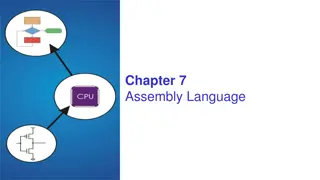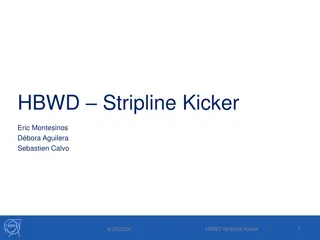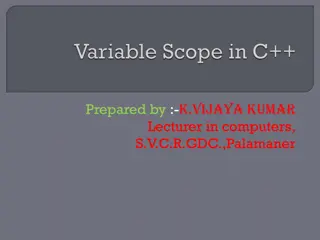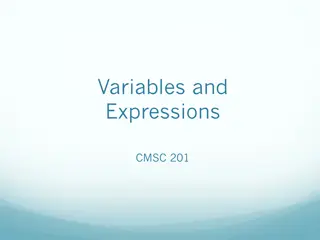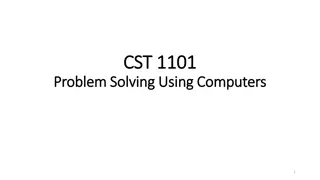Assembly Programs and Procedures: Understanding Procedures, Local Variables, and Stack Management
Delve into the world of assembly programs as we explore the intricacies of procedures, local variables, and stack management. Learn how each procedure maintains a scratchpad of register values, the role of the program counter in jump-and-link operations, and the significance of the stack in storing procedure values. Discover the importance of saving and restoring register values, as well as the necessity of storage management in call/return processes.
Download Presentation

Please find below an Image/Link to download the presentation.
The content on the website is provided AS IS for your information and personal use only. It may not be sold, licensed, or shared on other websites without obtaining consent from the author.If you encounter any issues during the download, it is possible that the publisher has removed the file from their server.
You are allowed to download the files provided on this website for personal or commercial use, subject to the condition that they are used lawfully. All files are the property of their respective owners.
The content on the website is provided AS IS for your information and personal use only. It may not be sold, licensed, or shared on other websites without obtaining consent from the author.
E N D
Presentation Transcript
More about Functions ESC101: Fundamentals of Computing Nisheeth
int max (int a, int b) { if (a > b) return a; else return b; } 2 arguments a and b, both of type int. (formal args) Return Type Function Name Body of the function, enclosed inside { and } (mandatory) returns an int. int main () { int x; x = max(6, 4); printf( %d ,x); return 0; } Call to the function. Actual args are 6 and 4. 2
For functions that do not need to return anything i.e. void return type, you can either say return; or More on Return else not write return at all inside the function body in which case the entire body will get executed May write return statement many times inside a function When Mr C (his dream world clone actually) sees a return statement, he immediately generates the output and function execution stops there. The dream ends and the original Mr C takes over If you return a float/double value from a function with int return type, automatic typecasting will take place. Be careful to not make typecasting mistakes
main() is also a function with return type int More on Return main() is like a reserved function name. Cannot name your function main The value that is returned can be used safely just as a normal variable of that same data type You can freely use returned values in expressions Be careful of type though Can even use within printf int main(){ printf("%d", sum(3,4) - sum(5,6)); return 0; } int sum(int x, int y){ return x + y; }
Function and Expression A function call is an expression. Can be used anywhere an expression can be used subject to type restrictions Example below: assume we have already written the max and min functions for two integer arguments printf( %d , max(5,3)); max(5,3) min(5,3) max(x, max(y, z)) == z prints 5 evaluates to 2 checks if z is max of x, y, z prints Y if max of a and b is not 0. if (max(a, b)) printf( Y );
Nested Function Calls #include<stdio.h> int min(int, int); //declaration int max(int, int); //of max, min Not just main function but other functions can also call each other int max(int a, int b) { return (a > b) ? a : b; } A declaration or definition (or both) must be visible before the call // this cryptic min, uses max :-) int min(int a, int b) { return a + b max (a, b); } Help compiler detect any inconsistencies in function use int main() { printf( %d , min(6, 4)); } Compiler warning, if both (decl & def) are missing
Inception 3 3 int inc(int a){ return a+1; } int sum(int a, int b){ int c = inc(a) + b; return c; } int main(void){ int a = 2, b = 4, c; c = sum(a, b); printf("%d", c); return 0; } Goodbye, cruel world! inc() a 7 7 2 sum() a b c 7 2 2 4 4 main() a b c ESC101: Fundamentals of Computing
Same function called repeatedly Hello again Goodbye again int inc(int a){ return a+1; } int sum(int a, int b){ int c = inc(a) + inc(b); return c; } int main(void){ int a = 2, b = 4, c; c = sum(a, b); printf("%d", c); return 0; } 3 3 5 5 inc() a 8 8 4 2 sum() a b c 8 2 2 4 4 main() a b c ESC101: Fundamentals of Computing
The 6 Basic Rules of Functions RULE 1: When we give a variable as input, the value stored inside that variable gets passed as an argument RULE 2: When we give an expression as input, the value generated by that expression gets passed as argument RULE 3: In case of a mismatch b/w type of arg promised and type of arg passed, typecasting will be attempted WARNING: may cause loss of information or unexpected behavior ESC101: Fundamentals of Computing
The 6 Basic Rules of Functions RULE 4: All values passed to a function get stored in a fresh variable inside that function Modifying that value inside the function will NOT change the original value Does not matter whether the value passed is char or long or an address address returned isn t NULL Careful, all return statements must return only one value, and that too of the type promised in the function However, verify that the float returned is not negative Yes, you may have multiple return statements but the dream world clone will die the moment any one of them is seen However, verify that the int gives an index within bounds However, verify that the RULE 5: Value returned by a function can be used freely in any way values of that data-type could have been used If function is returning a float, feel free to take square root with it If function is returning an int, feel fee to use it as an array index Remember, Mr C terminates a function the moment any return statement is seen RULE 6: All clones share the memory address space Let us look at this rule more closely ESC101: Fundamentals of Computing
RULE 6: the address rule We have seen that the clones do not care what names other clones have given to variables all passed values are copied However, all clones see and work with the same shared memory Consider an address 000008 no matter which clone tries to read from, or write to, address 000008, they will all do so from the exact same address Will exploit this feature very soon! 000000 000001 000002 000003 000004 000005 000006 000007 000008 000009 000010 000011 000012 000013 000014 000015 000016 000017 000018 000019 000020 000021 000022 000023 a 42 55 Memory location 000008 stores the integer 42 the integer 55 Memory location 000008 stores I also see 42 at memory location 00008 location 00008 I also see 55 at memory Guys, I am changing the value at location 000008 to 55 I too see 42 at location 000008 location 000008 I too see 55 at ESC101: Fundamentals of Computing
Passing simple variables/expressions This is the case when the input to the function is either a variable (Rule 1) or an expression (Rule 2) Rule 4 (fresh variables) will always apply no matter what is passed as input Books, websites often call this technique pass-by-value int neg(int a){ return -a; } int main(void){ int a = 2; printf("%d", neg(a)); printf("%d", neg(4*2); return 0; } -2 -2 -8 -8 neg() a -2-8 2 2 8 8 main() a ESC101: Fundamentals of Computing
Summary We have seen how normal variables (int, float, char) can be passed to functions (rule 1) and how expressions of these (rule 2) can be passed to functions Sometimes called pass-by-value We have not yet seen how pointers (rule 1) and expressions that generate addresses (rule 2) can be passed to functions Sometimes called pass-by-pointer or pass-by-reference We will see this later Remember - rule 4 always applies, no matter what! Will see pass-by-array later ESC101: Fundamentals of Computing
Next Class.. Static and global variables Macros ESC101: Fundamentals of Computing
